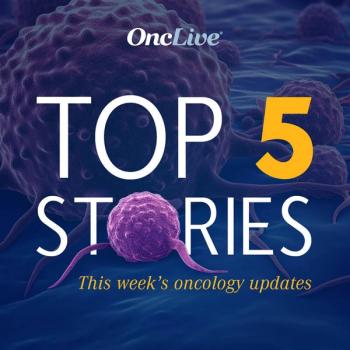
FDA Grants Emergency Use Authorization to Tocilizumab for COVID-19
The FDA has issued an emergency use authorization for intravenous tocilizumab for the treatment of adult and pediatric patients who have been hospitalized, are receiving systemic corticosteroids, and require supplemental oxygen, noninvasive or invasive mechanical ventilation, or extracorporeal membrane oxygenation
The FDA has issued an emergency use authorization for intravenous tocilizumab (Actemra/RoActemra) for the treatment of adult and pediatric patients who have been hospitalized, are receiving systemic corticosteroids, and require supplemental oxygen, noninvasive or invasive mechanical ventilation, or extracorporeal membrane oxygenation.1
Tocilizumab is an agent that is used for toxicities associated with cancer therapy, among other indications. As CAR T-cell therapy becomes more dominant in the field of oncology, particularly for patients with hematologic malignancies, tocilizumab has become a critical component to care, having received FDA approval for the treatment of cytokine release syndrome that is severe or life-threatening.2
The decision is supported by data from 4 randomized, controlled studies (RECOVERY [NCT04381936], COVACTA [NCT04310615], EMPACTA [NCT04372186], and REMDACTA [NCT04409262]) that examined the drug in the treatment of more than 5500 hospitalized patients with COVID-19.3 Data indicate that tocilizumab could improve outcomes for those who are on corticosteroids and need supplemental oxygen or breathing support.
“Even with the availability of vaccines and declines in deaths from COVID-19 in various parts of the world, we continue to see new hospitalizations from severe forms of the disease,” Levi Garraway, MD, PhD, chief medical officer and head of Global Product Development at Roche, stated in the press release. “We are pleased that [tocilizumab] is now authorized as an option that may help improve outcomes for adults and children hospitalized with COVID-19 in the United States.”
In the open-label, multicenter, RECOVERY trial, which was done in the United Kingdom, investigators examined the safety and efficacy of potential treatment for adult patients with severe COVID-19 pneumonia who were hospitalized.
All patients determined to be eligible received regular care and then underwent randomization. These patients had clinically suspected or confirmed SARS-CoV-2 infection without medical contraindications to any of the treatments. Those with clinical evidence of progressive COVID-19 were able to undergo a second randomization to either intravenous tocilizumab or usual care alone.
The intent-to-treat (ITT) population comprised 4116 patients; 2022 received tocilizumab plus usual care and 2094 were provided with usual care alone. The mean age of study participants was 63.6 years, 67% were male, 76% were White, and 82% were receiving systemic corticosteroids. Moreover, 14% required invasive mechanical ventilation, 41% needed non-invasive ventilation or high-flow oxygen, and 45% needed low-flow oxygen.
The primary outcome measure was time to death through day 28. Results indicated that the hazard ratio (HR) for tocilizumab/usual care vs usual care alone was 0.85 (95% CI, 0.76-0.94; P = .0028). The probability of dying at day 28 in the investigative and control arms were 30.7% and 34.9%, respectively. Investigators also reported an estimated risk difference of -4.1% (95% CI, -7.0% to -1.3%). The HRs in those receiving corticosteroids vs not, were 0.79 (95% CI, 0.70-0.89) and 1.16 (95% CI, 0.91-1.48), respectively.
Moreover, in the tocilizumab/usual care arm, the median time to hospital discharge was 19 days; it was over 28 days in the usual care–alone arm (HR, 1.22; 95% CI, 1.12-1.33).
Of those who did not require invasive mechanical ventilation at baseline, 35% of patients in the investigative arm needed mechanical ventilation or died by day 28 (n = 619/1754) vs 42% (n =754/1800) of those in the control arm (risk ratio, 0.84; 95% CI, 0.77-0.92).
The double-blind, placebo-controlled, multicenter, phase 3 EMPACTA trial evaluated the safety and efficacy of intravenous tocilizumab plus standard of care (SOC) in adult patients with COVID-19 pneumonia who were hospitalized and not on a ventilator.
To be eligible for inclusion, patients needed to be at least 18 years of age, have confirmed SARS-CoV-2 infection, confirmed pneumonia, and a SpO2 of less than 94% on ambient air. Participants were randomized 2:1 to 1 infusion of 8 mg/kg of tocilizumab, with a maximum dose of 800 mg, or placebo.
In patients who did not experience an improvement in clinical symptoms, or symptoms worsened, they could receive an additional infusion of either tocilizumab or placebo, as long as it was 8 to 24 hours following the first infusion. The primary end point of the trial was the cumulative proportion of patients who needed mechanical ventilation or died by day 28.
A total of 389 patients underwent randomization and a total of 377 patients made up the modified ITT population; of these patients, 249 received tocilizumab plus SOC and 128 received placebo.
The median age of study participants was 57 years (range, 20-95), 59.2% were male, and 56.0% were Hispanic or Latino. At baseline 9.3% were not receiving supplemental oxygen, 64.2% needed low-flow oxygen, and 26.5% required high-flow oxygen. Moreover, 72.7% of patients were receiving systemic corticosteroids and 47.7% received remdesivir (Veklury).
Results indicated that tocilizumab improved the time to progression to mechanical ventilation or death vs placebo (HR, 0.56; 95% CI, 0.33-0.97; log-rank, P = .0360). In the investigative and control arms, the cumulative proportion of patients who needed mechanical ventilation or died by day 28 were 12.0% (95% CI, 8.52%-16.86%) and 19.3% (95% CI, 13.34%-27.36%), respectively.
Moreover, the median time to hospital discharge through day 28 with tocilizumab was 6.0 days vs 7.5 days with placebo (HR, 1.16; 95% CI, 0.91-1.48). At day 28, mortality rates in the investigative and control arms were 10.4% and 8.6%, respectively (weighted difference, 2.0%; 95% CI, -5.2% to 7.8%).
The global, double-blind, placebo-controlled, phase 3 COVACTA trial also assessed the safety and efficacy of intravenous tocilizumab plus SOC in hospitalized adult patients with severe COVID-19 pneumonia.
Patients needed to be aged 18 years or older, have confirmed SARS-CoV-2 infection, confirmed pneumonia, and oxygen saturation of 93% or lower on ambient air or a ratio of arterial oxygen partial pressure to fractional inspired oxygen of 300 mm Hg or less.
A total of 452 participants were randomized 2:1 to receive 1 infusion of tocilizumab at a dose of 8 mg/kg, with a maximum dose of 800 mg (n = 294), or placebo (n = 144). Again, if clinical symptoms worsened or failed to improve, investigators permitted an additional infusion of blinded treatment with tocilizumab or placebo. The primary end point of the trial was clinical status on day 28 per a 7-category ordinal scale.
Among the mITT population (n = 438), the median age was 62 years (range, 22-96), 69.9% were male, 57.5% were White, 22.4% were on systemic corticosteroids and 5.7% received remdesivir. Moreover, at baseline, 3.4% of patients did not require supplemental oxygen, 27.9% needed low-flow oxygen, 30.4% were receiving non-invasive ventilation or high-flow oxygen, and 38.4% required invasive mechanical ventilation.
Results indicated no statistically significant differences in the distribution of clinical status on the 7-category ordinal scale at day 28 when looking at tocilizumab vs placebo. The median time to hospital discharge in the investigative and control arms was 20 days vs 28 days, respectively (HR, 1.35; 95% CI, 1.02-1.79). The day-28 mortality rates in these arms were 19.7% vs 19.4%, respectively (weighted difference, 0.3%; 95% CI, -7.6 to 8.2).
Lastly, in the double-blind, placebo-controlled, multicenter, phase 3 REMDACTA trial, investigators evaluated the safety and efficacy of intravenous tocilizumab plus remdesivir vs placebo plus remdesivir in patients with severe COVID-19 pneumonia who were hospitalized.
Patients were at least 12 years of age, had confirmed SARS-CoV-2 infection, confirmed pneumonia, and needed supplemental oxygen of more than 6 L/min to maintain SpO2 of greater than 93%.
A total of 649 study participants were randomized 2:1 to 1 infusion of tocilizumab at 8 mg/kg, with a maximum dose of 800 mg, plus remdesivir (n = 430) or placebo plus remdesivir (n = 210). All study treatment was administered with SOC. Like the other trials, if clinical symptoms worsened or failed to improve, investigators permitted an additional infusion of blinded treatment with tocilizumab or placebo.
The primary efficacy end point of the trial was time from randomization to hospital discharge up to day 28.
Results revealed no statistically significant differences between the arms with regard to time to hospital discharge through day 28 (HR, 0.965; 95% CI, 0.78-1.19) or time to mechanical ventilation or death through day 28 (HR, 0.980; 95% CI, 0.72-1.34). Day-28 mortality rates in the investigative and control arms were 18.1% and 19.5%, respectively (weighted difference, -1.3%; 95% CI, -7.8% to 5.2%).
No new safety signals with tocilizumab were observed in any of the studies. The most frequent adverse effects reported with the agent included constipation, anxiety, diarrhea, insomnia, hypertension, and nausea.
Previously,
References
- Roche’s Actemra/RoActemra receives US FDA emergency use authorization for the treatment of COVID-19 in hospitalized adults and children. News release. F. Hoffmann-La Roche Ltd. June 25, 2021. Accessed June 25, 2021.
https://bit.ly/3hb3TQt - Le RQ, Li L, Yuan W, et al. FDA approval summary: tocilizumab for the treatment of chimeric antigen receptor T cell-induced severe or life-threatening cytokine release syndrome. Oncologist. 2018;23(8):943-947. doi:10.1634/theoncologist.2018-0028
- Fact sheet for healthcare providers: emergency use authorization for Actemra (tocilizumab). F. Hoffmann-La Roche Ltd. Accessed June 25, 2021.
https://bit.ly/3w3BYr6 - Sgherza N, Curci P, Strafella V, et al. Implications of interleukin-6 (IL-6)-blockade for severe COVID-19 infections in patients with multiple myeloma. Presented at: 2nd European Myeloma Network; March 3-6, 2021; Virtual. Poster P63.




































